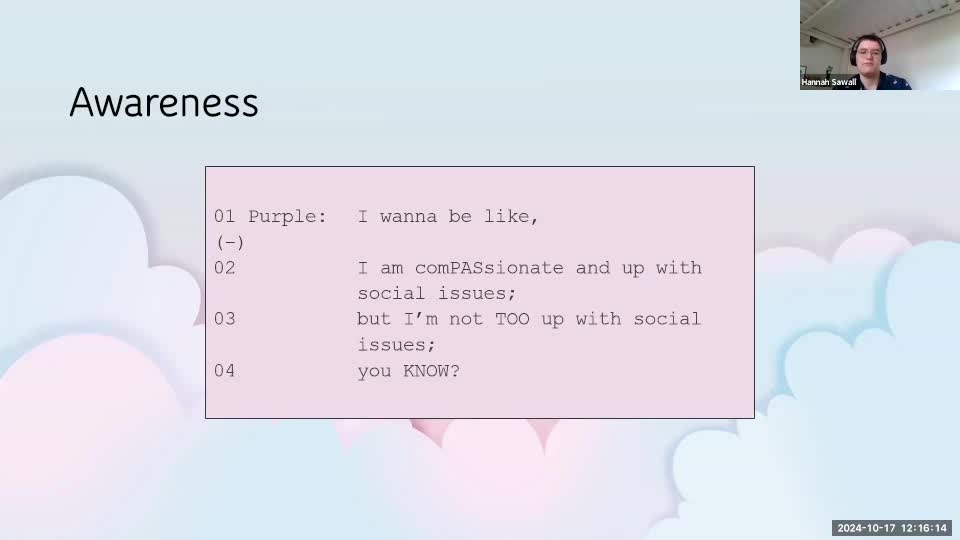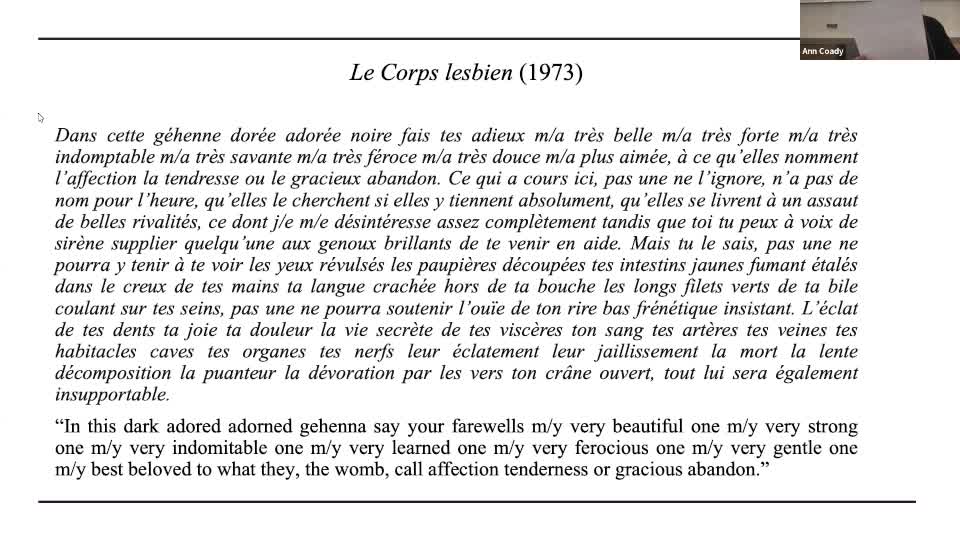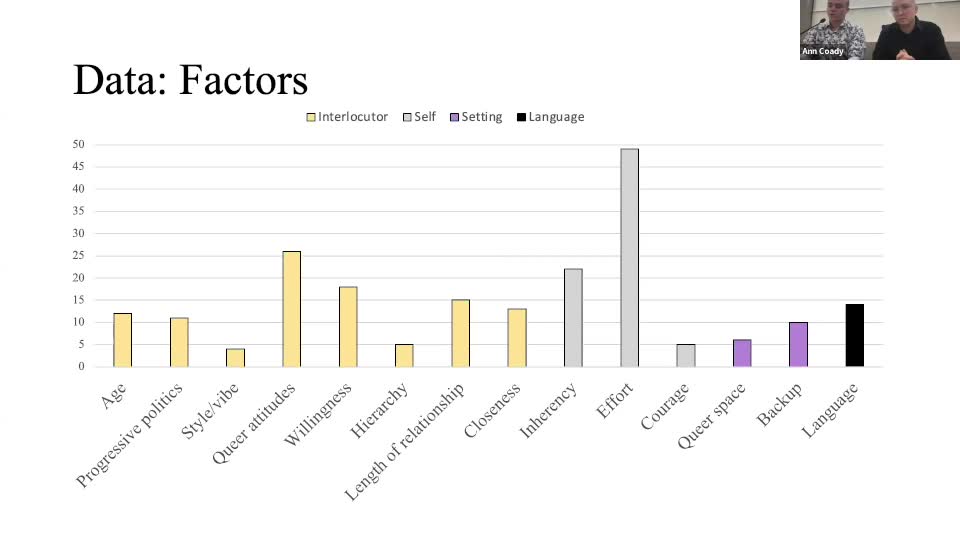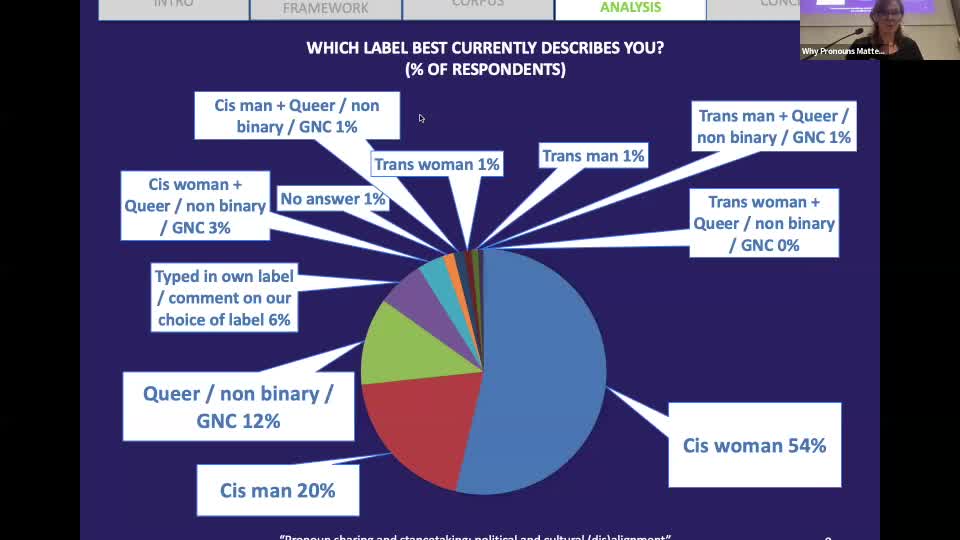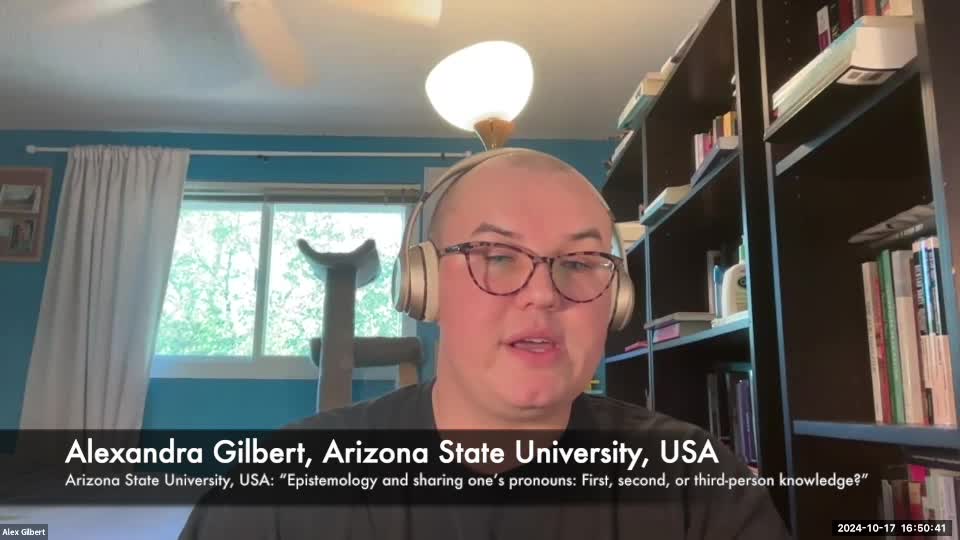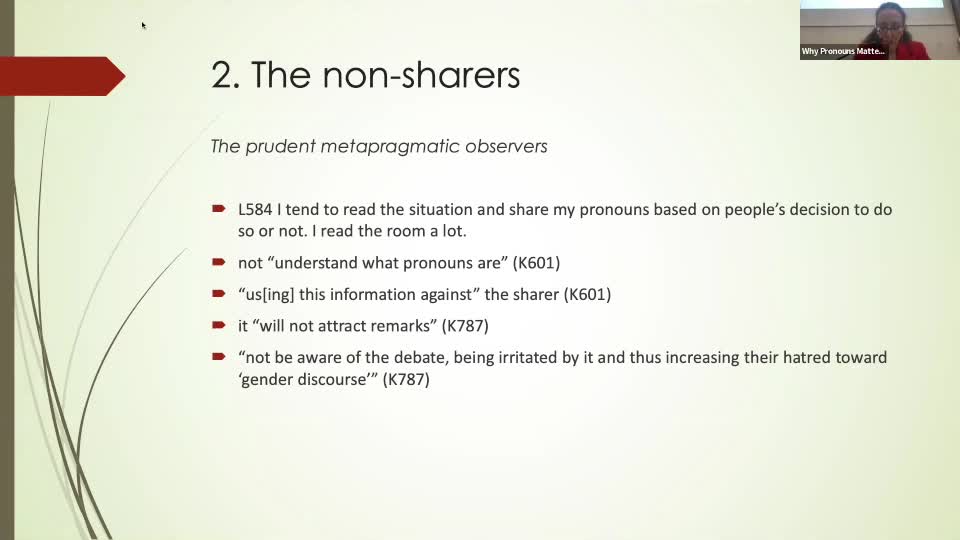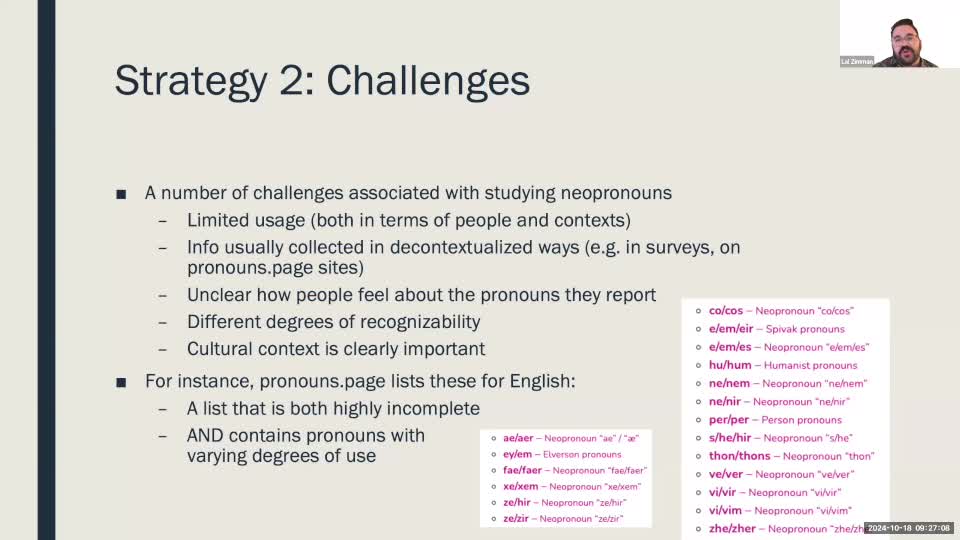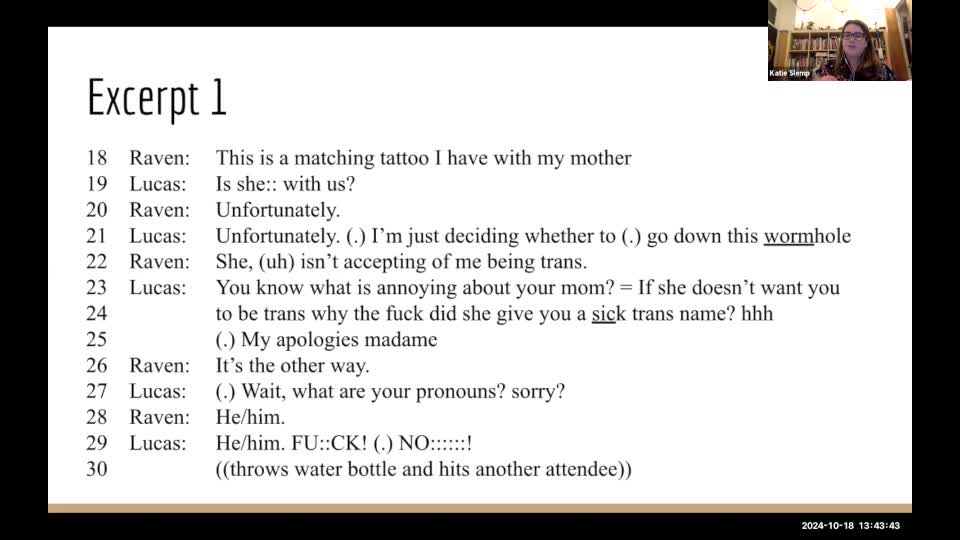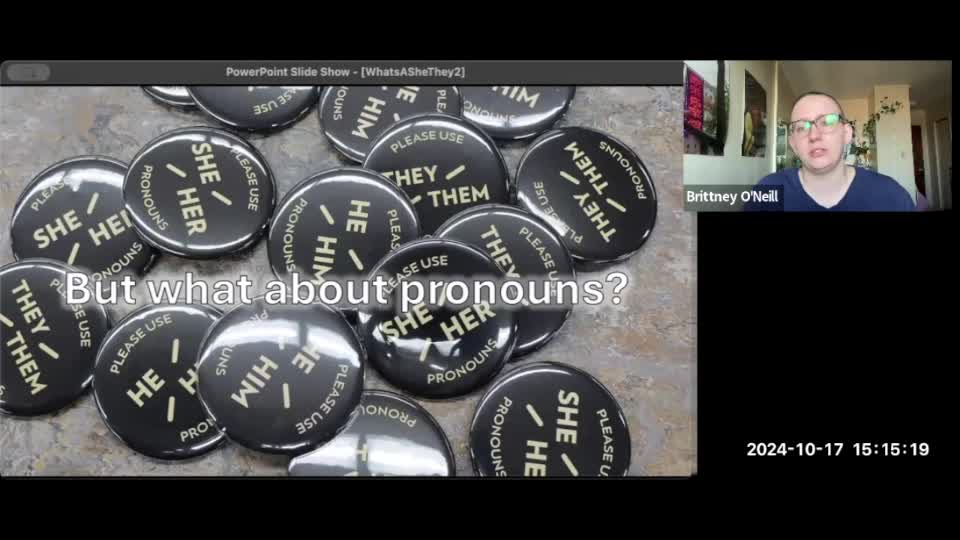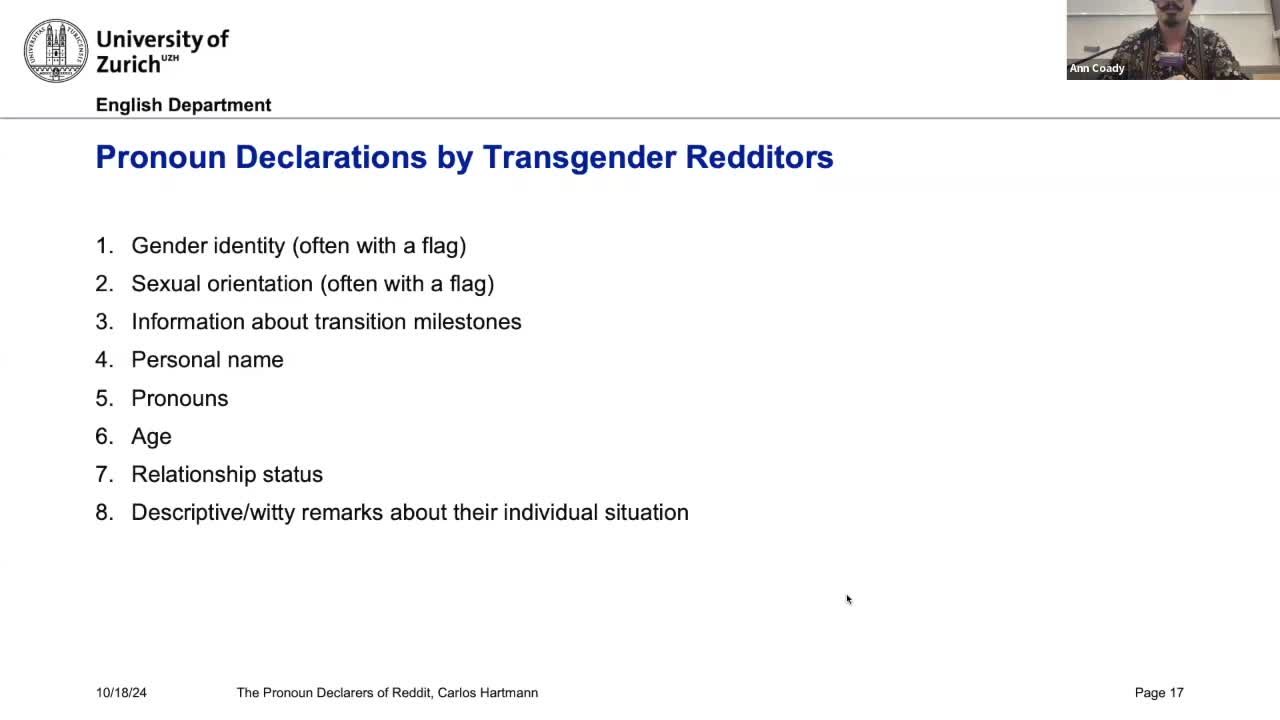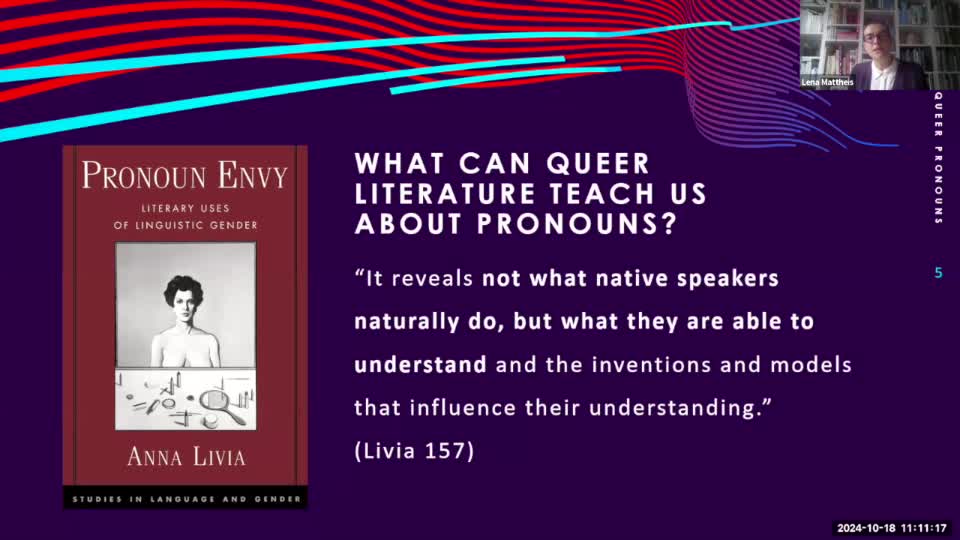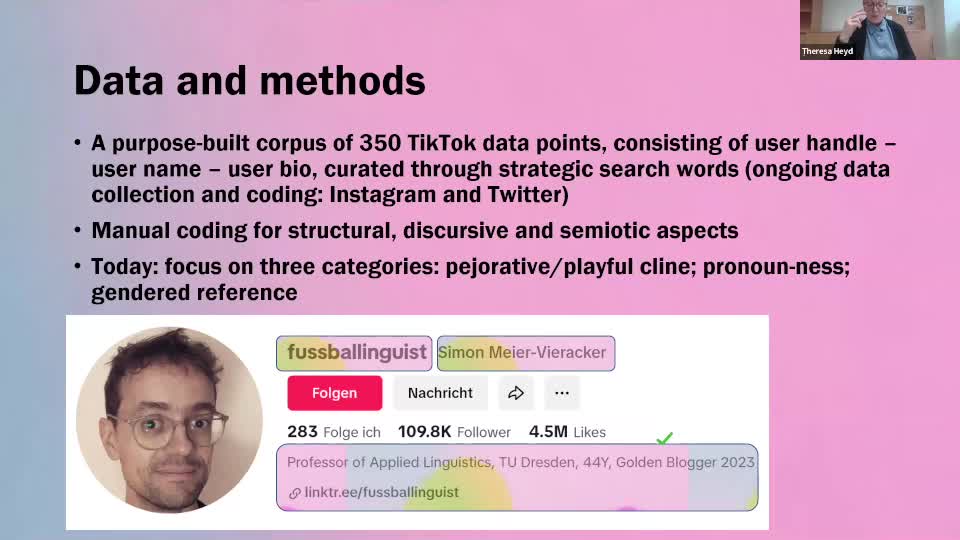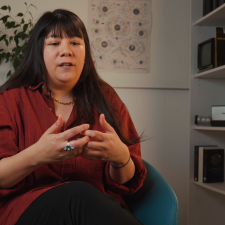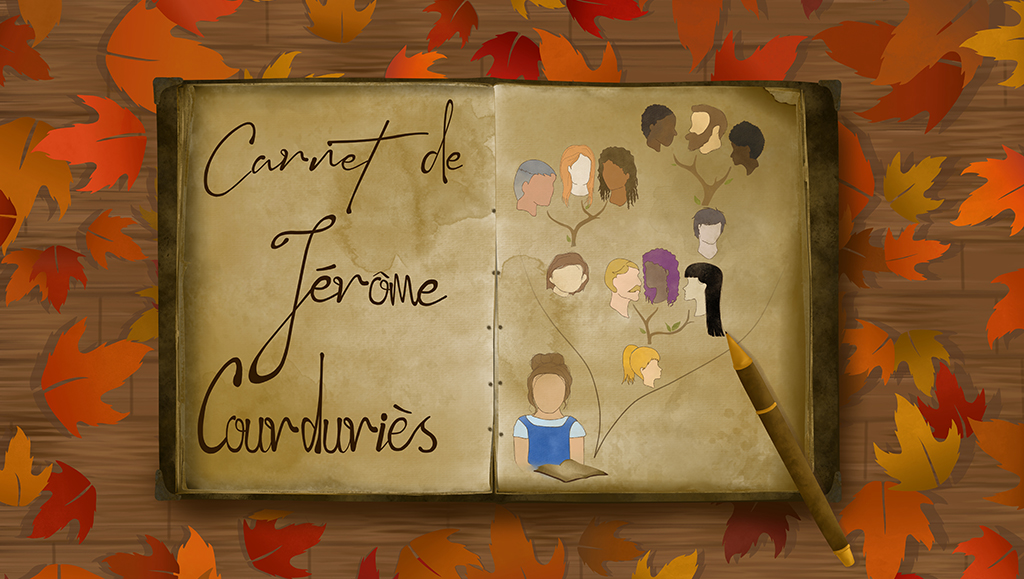Notice
“Pronouns in bio: A site of empowerment, validation, struggle, performance, distraction, and corporate rainbow washing?”, Laura Paterson, Open University, UK
- document 1 document 2 document 3
- niveau 1 niveau 2 niveau 3
Thème
Dans la même collection
-
““Mein Name ist Lena und meine Pronomen sind she/her”: Exploring Indexicalities of Pronoun Sharing …
Since pronoun sharing has been associated with different political stances from virtue signaling to trans liberation, it is clear that they transport more information than simply how a person asks to
-
“Pronouns, past struggles, new practices: political continuity or radical change?”, Claudine Raynau…
RaynaudClaudineI would like to compare two second wave French feminists’ thought and LGBTQIA+ theorizing and practice regarding pronouns and ponder their possible interactions. My focus will be the work of Luce
-
“Pronouns in Motion: Pronoun variability among Swiss non-binary individuals”, Justyna King and Elij…
Our paper aims to explore pronoun practices and flexibility among Swiss non-binary individuals, by elucidating the factors influencing the pronoun usage of Swiss non-binary people, discerning the
-
“Pronoun sharing and stancetaking: political and cultural (dis)alignment”, Ann Coady, Université Pa…
I begin my presentation by putting current pronoun-sharing practices in political and theoretical context, briefly discussing the current political debate surrounding these practices and comparing
-
“Epistemology and sharing one’s pronouns: First, second, or third-person knowledge?”, Alexandra Gil…
In this paper, I consider sharing one’s pronouns as an act that asserts self-knowledge and positions oneself in relation to an addressee and a shared social landscape: see me this way, interact with
-
“What’s in a pronoun and how does it matter?: From the perspective of pragmatics”, Sandrine Sorlin,…
SorlinSandrineIn this talk, I wish to give a quick overview of the quite recent ‘pronoun sharing’ trend from a linguistic and pragmatic perspective, going through the new collocations and semantic shifts of the
-
"Pronouns, positionality, and power: Institutionalized transphobia, intersectionality and trans-aff…
ZimmanLalThis talk explores the complex role of pronouns in the negotiation of (socio)linguistic justice, leading to the argument that the success of trans-affirming language depends on a broader
-
““Wait, what are your pronouns, sorry?”: Conversation analysis of pronoun requests in comedians’ cr…
Comedians on TikTok frequently show videos of their crowd work, where they ask questions to the attendees. While this is not part of their structured stand-up, it allows for spontaneous interaction
-
““What’s a she/they?”: An (auto)ethnographic exploration of epistemic justice and the double bind o…
In this paper, I combine autoethnographic reflections with an exploration of epistemic injustice (e.g. Berenstain, 2016; Davis, 2016; Fricker, 2007; Pohlhaus, 2014) to consider how the persistent
-
“A sociolinguistic case study on the Pronoun Declarers of Reddit”, Carlos Hartmann, Universität Zür…
For this study, I extracted and analyzed Reddit comments featuring pronoun declarations within their user flairs, the optional descriptors displayed alongside usernames. The goal was to identify a
-
“Gendernonconforming Pronouns in Literature”, Lena Mattheis, University of Surrey, UK
Queerly reshaped pronouns, forms and narrative strategies are flourishing in contemporary non-binary, trans and queer literature. From singular ‘they’ to ‘it’ to neopronouns to the collective voice of
-
“Mock pronouns”, Theresa Heyd, Universität Heidelberg, Germany
HeydTheresaThis paper gives an account of mock pronouns as a (predominantly digital) discursive practice. The rise of pronouns and pronominal discourse as a gender-inclusive practice has been accompanied by
Sur le même thème
-
Entretien avec Ariane Mak autour de son ouvrage En guerre et en grève. Enquêtes dans les cités mini…
MakArianeDe 1939 à 1945, le Royaume-Uni a connu plus de 7 000 grèves, en grande partie dans l’industrie charbonnière.
-
Prendre position dans le trouble / Carnet de passages #2
CourdurièsJérômePitzalisJuliaPeyrautLolaMontécotRobinPayssanAlexiComment s’empare-t-on d’une toute nouvelle thématique ? Comment traiter d’un sujet d’actualité mais surtout polémique ? L’expérience de l’anthropologue Jérôme Courduriès s’est construite au travers
-
““Wait, what are your pronouns, sorry?”: Conversation analysis of pronoun requests in comedians’ cr…
Comedians on TikTok frequently show videos of their crowd work, where they ask questions to the attendees. While this is not part of their structured stand-up, it allows for spontaneous interaction
-
“Pronouns, past struggles, new practices: political continuity or radical change?”, Claudine Raynau…
RaynaudClaudineI would like to compare two second wave French feminists’ thought and LGBTQIA+ theorizing and practice regarding pronouns and ponder their possible interactions. My focus will be the work of Luce
-
“What’s in a pronoun and how does it matter?: From the perspective of pragmatics”, Sandrine Sorlin,…
SorlinSandrineIn this talk, I wish to give a quick overview of the quite recent ‘pronoun sharing’ trend from a linguistic and pragmatic perspective, going through the new collocations and semantic shifts of the
-
““What’s a she/they?”: An (auto)ethnographic exploration of epistemic justice and the double bind o…
In this paper, I combine autoethnographic reflections with an exploration of epistemic injustice (e.g. Berenstain, 2016; Davis, 2016; Fricker, 2007; Pohlhaus, 2014) to consider how the persistent
-
“Mock pronouns”, Theresa Heyd, Universität Heidelberg, Germany
HeydTheresaThis paper gives an account of mock pronouns as a (predominantly digital) discursive practice. The rise of pronouns and pronominal discourse as a gender-inclusive practice has been accompanied by
-
“Pronouns in Motion: Pronoun variability among Swiss non-binary individuals”, Justyna King and Elij…
Our paper aims to explore pronoun practices and flexibility among Swiss non-binary individuals, by elucidating the factors influencing the pronoun usage of Swiss non-binary people, discerning the
-
“A sociolinguistic case study on the Pronoun Declarers of Reddit”, Carlos Hartmann, Universität Zür…
For this study, I extracted and analyzed Reddit comments featuring pronoun declarations within their user flairs, the optional descriptors displayed alongside usernames. The goal was to identify a
-
““Mein Name ist Lena und meine Pronomen sind she/her”: Exploring Indexicalities of Pronoun Sharing …
Since pronoun sharing has been associated with different political stances from virtue signaling to trans liberation, it is clear that they transport more information than simply how a person asks to
-
“Pronoun sharing and stancetaking: political and cultural (dis)alignment”, Ann Coady, Université Pa…
I begin my presentation by putting current pronoun-sharing practices in political and theoretical context, briefly discussing the current political debate surrounding these practices and comparing
-
"Pronouns, positionality, and power: Institutionalized transphobia, intersectionality and trans-aff…
ZimmanLalThis talk explores the complex role of pronouns in the negotiation of (socio)linguistic justice, leading to the argument that the success of trans-affirming language depends on a broader


